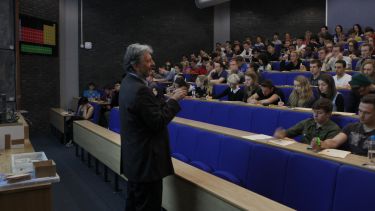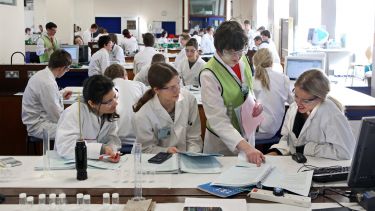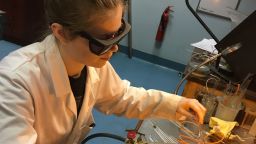Teaching
Sheffield chemistry students learn in lots of different ways. You'll work on research projects in the lab, be introduced to key concepts in lectures, and increase your analytical abilities in small group tutorials and workshops.

Lectures, tutorials and workshops
Lectures are a big part of university life – a chance to learn the fundamentals from recognised experts and get insights into the latest research. You'll also have tutorials and workshops to build on the topics you've covered in lectures and show you how to apply concepts to solving real problems. These small group teaching sessions are led by your personal tutor in first year, and specialist tutors who are experts in the specific topics you're studying in later years.
Our lecture recording system means you can watch your lectures again later. This is perfect for revisiting content during exam revision, or catching up if you were absent.
Laboratory sessions
You'll spend one day every week in the laboratory in first year, moving up to two days a week in second and third year. If you do a four-year MChem course, you'll join one of our research groups in your final year, and spend most of your time working in a team of professional scientists.
The staff who run our teaching laboratories will take you from fundamental lab skills to conducting your own research experiments, and recording and analysing data from chemical samples you've prepared.
Research projects
From the start of your degree, you'll start developing the practical skills that scientists use in their research. You'll also learn about the goals, philosophy and implications of science and the scientific method – the guiding principles that drive new ideas, approaches and discoveries.
In third year, you'll put this into practice with your own research project. You'll gather and evaluate data, run your own experiments and present your findings.
If you do a four-year MChem course, you'll spend most of your final year on a more advanced project, tackling a real research problem. You'll choose the topic, get specialist training from scientists working in one of our research groups and have access to state-of-the art equipment.
Summer research placements
Each year undergraduate students can apply to join the Sheffield Undergraduate Research Experience scheme. This gives you a bursary to spend around six weeks working in one of our research groups over the summer.
It's designed to give you even more research experience to put on your CV, and can help you stand out when you're applying for jobs.
We can guarantee you a placement if you meet the requirements of our Undergraduate Research Scholarship scheme: Learn more
Learning resources
All new undergraduate students are given learning and laboratory resource packs, and access to lots of online resources, to help you with your studies.
- Learning resource pack
-
- The latest versions of our required core text books used across all years of your study
- A molecular model kit to help you visualise 3D chemical structures
- An electronic version of 'The Laboratory Assistant' to help you during laboratory sessions
- An electronic copy of our departmental data booklet
- A memory stick for your laboratory data
- Tutorial workbooks
- Laboratory resource pack
-
- Laboratory coat
- Safety glasses
- Glass marker and spatula
- Safety gloves
- Comprehensive laboratory manuals
- Laboratory notebook
- Online resources
-
Alongside lecture notes and handouts, you will have access to a range of online resources to help you study. This includes the University's virtual learning site, where you can download problem-solving explainer videos and other course materials, take part in discussions, complete assessments, and get your grades and feedback. You'll also be able to use specialist chemistry software, such as ChemDraw and CrystalMaker, to draw out and animate complex chemical structures.
We timetable teaching across the whole of our campus, the details of which can be found on our campus map. Teaching may take place in a student’s home department, but may also be timetabled to take place within other departments or central teaching space.


